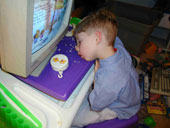 |
Q: My 10-year-old son played computer games all through the summer vacation. He has become withdrawn, stays in front of the computer the whole day and is unhappy about going to school. He also complains of pain in the thumbs. Please advise.
A: Unfortunately, your son is showing all the signs of being addicted to computer games. This is a big problem in many countries. But fortunately, he is still young enough for you to enforce discipline and forbid the games.
Encourage the child to be more physically active. This way, his health will improve. As he participates in team sports, he will develop interpersonal skills, self-discipline and a well-rounded personality. These are skills essential for success.
His fingers may be developing “tenosynovitis” from overuse. Ask him to flex and extend the palms several times a day. He can also press and release a tennis ball held in the hands.
Stop snuff
Q: I stopped smoking about five years ago but I use snuff to clear my blocked nose. Is that harmful?
A: Snuff contains tobacco along with various other chemicals. Snorting snuff is associated with all the long-term detrimental affects of smoking. Tobacco is harmful, irrespective of whether it is smoked, inhaled or chewed. You can clear your nose with saline nose drops and steam inhalations.
Food wise
Q: My two-year-old refuses to eat. She runs away whenever I bring food near her. She has started to spit out Cerelac as well. I feed her every two hours and beat everything with milk in a food processor. What should I do?
A: A two-year-old should be eating the same food as the rest of the family. However, in addition to the three main meals of breakfast lunch and dinner, two homemade and healthy snacks need to be given at around 10 am and 5 pm. It is better to avoid fast food like chips and tinned processed infant foods such as Cerelac (your child is too old for it anyway). Also, she requires only 400ml of milk a day, preferably 200ml in the morning after breakfast and 200ml at tea time.
The sight and smell of food should be pleasing for it to be appetising. Food mashed and blended with milk may not be very appealing.
You may also try deworming her with albendazole.
Life line
Q: My aunt, 84, is on a ventilator in the intensive care unit. The doctor says she has bled into the brain and will not regain consciousness. He asked us to decide when we want to switch off the machine. What should we do?
A: The doctor is right. As the patient is 84 and has been dependent on the machine for some time now, her chances of recovery are slim. If all her other organs like the heart and kidney are working, leave her on the ventilator until one more organ fails (for example, if the heart stops beating). Then make a decision to switch off the ventilator. Your aunt’s legal heirs should be willing to do this. They should either be present or express their consent in writing.
Poor heeled
Q: I am not able to put my right foot down in the morning because of terrible pain in the heel. I am 35. Please advise.
A: You may have a condition called “calcaneal tendonitis” or there may be an extra growth of bone called “spur”. The condition is aggravated in overweight people.
To reduce the pain, wear slippers with soft rubber soles all the time, both in the house and outside. Soak the feet in hot water for 10 minutes morning and evening.
A physiotherapist may be able to help you with heat therapy. If all this fails and the pain persists, you need to consult an orthopaedic surgeon. He may offer you an injection in the affected heel. This alleviates the pain tremendously. If not, surgery may eventually have to be done.
Sore lips
Q: Every time I have fever, I develop ugly blisters near my lips. What should I do?
A: The blisters are “cold sores”. They are caused by the Herpes virus which, after an initial infection, probably during childhood, takes up permanent residence in a nerve root. Every time the immunity is compromised with an infection, the virus rears its head.
The area usually begins to tingle and prick when the blisters are about to erupt. Immediately start applying 5 per cent acyclovir ointment (available under various trade names) to the area four times a day using cotton buds. This will expedite healing.
Cat bite
Q: I got bitten by a cat. Is it dangerous?
A: Cats carry rabies and their bite is dangerous. The wound needs to be cleaned thoroughly with soap and water. After that apply an antiseptic ointment like poviodone-iodine (Betadine, Wockadine).
You need to take a booster dose of tetanus toxoid if you have not had one in the last three years. You also need anti-rabies vaccine. Please consult your physician at the earliest for the schedule and dosage of injections.










